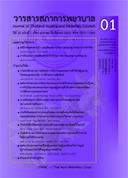Factors Influencing Maternal Health Literacy in Pregnant Women
Keywords:
maternal health literacy, pregnancy period, maternal healthAbstract
Abstract:
Objective: To study how age, educational level, family income, order of pregnancy, social support, number of antenatal visits, and the number of group-based antenatal education sessions could influence maternal health literacy.
Design: Cross-sectional predictive research.
Methodology: The participants consisted of 211 pregnant women at Siriraj Hospital’s Maternity Clinic, who had a gestational age of 37 weeks or more. Data were collected using a personal record form, a social support questionnaire, and the Maternal Health Literacy Scale. Descriptive statistics and multiple linear regression were used for data analysis.
Results: Age, educational level, family income, order of pregnancy, social support, the number of antenatal visits, and the number of group-based antenatal education sessions were capable of jointly explaining 35.40% of variation in the participants’ maternal health literacy (R2 = .354, F = 15.920, p < .0001). The factors with statistically signifcant influence on maternal health literacy were social support (β = .534, p < .0001), family income (β = .172, p = .005), order of pregnancy (β = .151, p = .016), and the number of group-based antenatal education sessions (β = .131, p = .024).
Recommendations: Nurses should provide healthcare information that responds to the health status and needs of pregnant women, especially primigravidae and those with low income. At least two group-based antenatal education sessions are recommended. Moreover, healthcare information should also be provided for husbands and family members to promote maternal health literacy in pregnant women.
Downloads
References
1. Renkert S, Nutbeam D. Opportunities to improve maternal health literacy through antenatal education:
an exploratory study. Health Promot Int 2001;16(4): 381-8.
2. Endres LK, Sharp LK, Haney E, Dooley SL. Health literacy and pregnancy preparedness in pregestational diabetes. Diabetes care 2004;27(2):331-4.
3. Mancuso JM. Health literacy: a concept/dimensional analysis. Nurs Health Sci 2008;10(3):248-55.
4. Nutbeam D. The evolving concept of health literacy. Soc Sci Med 2008;67(12):2072-8.
5. Nutbeam D. Defning, measuring and improving health literacy. HEP 2015;42(4):450-6.
6. Guttersrud O, Naigaga MD, Pettersen KS. Measuring maternal health literacy in adolescents attending antenatal care in Uganda: exploring the dimensionality of the health literacy concept studying a composite scale. J Nurs Meas 2015;23(2):e50-66.
7. Ferguson B. Health literacy and health disparities: the role they play in maternal and child health. NWH
2008;12(4):286-98.
8. Sorensen K, Van den Broucke S, Fullam J, Doyle G, Pelikan J, Slonska Z, et al. Health literacy and public
health: a systematic review and integration of defnitions and models. BMC Public Health 2012;12(1):80.
9. Naigaga MD, Guttersrud O, Pettersen KS. Measuring maternal health literacy in adolescents attending
antenatal care in a developing country - the impact of selected demographic characteristics. JCN 2015;
24(17-18):2402-9.
10. Poorman E, Gazmararian J, Elon L, Parker R. Is health literacy related to health behaviors and cell
phone usage patterns among the text4baby target population?. Arch Public Health 2014;72(1):13.
11. Tachasuksri T, Siriarunrat S, Suppasri P, Suppaseemanont W, Boonnate N, Kwannate C. Causal model for quality
of life among pregnant women. The Southern College Network Journal of Nursing and Public Health 2560; 4(1):28-46. (in Thai)
12. Venturelli N, Kalia I, Reed T, Pagaduan M, Riggs E, Merwin J, et al. Could group prenatal care work
by improving maternal health literacy. J Community Health 2016;41:1027–1032.
13. Cohen J. Multiple regression and correlation analysis. 2nd ed. New York: Academic Press; 1988.
14. Nualyong A, Athaseri S, Phancharoenworakul K, Chandaragga Y. The relationship among perception
of disease, social support, and self-care behavior in pregnancy induced hypertension patients [Thesis].
Bangkok: Mahidol University; 1992. (in Thai)
15. House JS. Work stress and social support. Philippines: Addison-Wesley; 1981
16. Health Education Division, Ministry of Public Health. Health literacy/health behavior [Internet].
2017 [cited 2019 mar 12]. Available from: URL: https://www.hed.go.th/linkHed/321
(in Thai)
17. Polit DF, Beck CT. Nursing research principles and methods. 7th ed. Philadelphia: Lippincott Williams & Wilkins; 2003.
18. Lee J-Y, Murry N, Ko J, Kim MT. Exploring the relationship between maternal health literacy, parenting self-effcacy,
and early parenting practices among low-income mothers with infants. JHCPU 2018; 29(4): 1455-71.
19. Squiers L, Peinado S, Berkman N, Boudewyns V, McCormack L. The health literacy skills framework. J Health Commun 2012;17(Suppl 3):30-54.
20. Gazmararian JA, Yang B, Elon L, Graham M, Parker R. Successful enrollment in Text4Baby more
likely with higher health literacy. J Health Commun 2012;17(Suppl 3):303-11.








